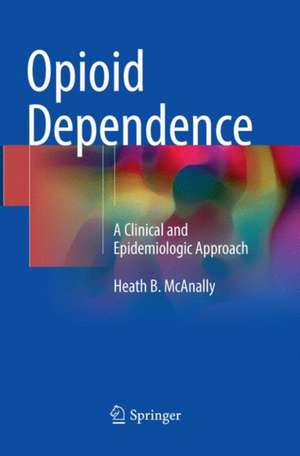Opioid Dependence: A Clinical and Epidemiologic Approach
Autor Heath B. McAnallyen Limba Engleză Paperback – 5 sep 2018
The book begins with a public health/epidemiologic examination of the situation, with a systematic view of the problem based on classic (infectious disease) epidemiologic principles applied to this behavioral health issue. This application is expanded to take into account the fact that unlike most epidemics in our species’ history, a unique factor that must be accounted for in any public health analysis is that the host (opioid-dependent/misusing patient) is generally not under sufficiently strong motivation to avoid the disease. The introduction concludes with a survey of recent containment approaches, categorized epidemiologically by target (agent, vector, host.)
| Toate formatele și edițiile | Preț | Express |
|---|---|---|
| Paperback (1) | 772.93 lei 38-44 zile | |
| Springer International Publishing – 5 sep 2018 | 772.93 lei 38-44 zile | |
| Hardback (1) | 850.32 lei 6-8 săpt. | |
| Springer International Publishing – 10 noi 2017 | 850.32 lei 6-8 săpt. |
Preț: 772.93 lei
Preț vechi: 813.60 lei
-5% Nou
Puncte Express: 1159
Preț estimativ în valută:
147.92€ • 160.62$ • 124.25£
147.92€ • 160.62$ • 124.25£
Carte tipărită la comandă
Livrare economică 18-24 aprilie
Preluare comenzi: 021 569.72.76
Specificații
ISBN-13: 9783319837512
ISBN-10: 3319837516
Pagini: 301
Ilustrații: XV, 301 p. 22 illus., 16 illus. in color.
Dimensiuni: 155 x 235 mm
Ediția:Softcover reprint of the original 1st ed. 2018
Editura: Springer International Publishing
Colecția Springer
Locul publicării:Cham, Switzerland
ISBN-10: 3319837516
Pagini: 301
Ilustrații: XV, 301 p. 22 illus., 16 illus. in color.
Dimensiuni: 155 x 235 mm
Ediția:Softcover reprint of the original 1st ed. 2018
Editura: Springer International Publishing
Colecția Springer
Locul publicării:Cham, Switzerland
Cuprins
An Epidemiologic Perspective.- Understanding the Agent, Part I: Opioid Biology and Basic Pharmacology.- Understanding the Agent, Part II: Adverse Effects.- Understanding the Agent, Part III: Specific Drugs.- Attenuating the Agent: Reducing Opioid “Virulence”.- Best Practices Education, Part I: Pain Physiology, Psychology, and Alternatives to Opioids .- Best Practices Education, Part II : Evidence for and against Opioid Therapy.- Best Practices Education, Part III: Regulatory and Advisory Issues Related to Opioid Therapy for Pain.- Addressing Host Factors: Overview of Dependence and Addiction.- Opioid Dependence Risk Factors and Risk Assessment.- Addressing Host Factors: Primary, Secondary and Tertiary Prevention of Opioid Dependence.- Conclusion.
Recenzii
“The book is intended for all healthcare professionals, specifically prescribers including physicians, nurse practitioners, advanced practice nurses, and residents who treat patients with acute and chronic pain. It is also appropriate for nonprescribers and trainees in healthcare settings managing these patient populations. … This book covers the increasingly problematic opiate abuse problem from an epidemiological perspective.” (Michael Easton, Doody's Book Reviews, March, 2018)
“This is quite of an intro into mind puzzling theme as opioid dependence which caught attention of all medical professionals prescribing opioid medications. … I would like to conclude that authors gave great insight into scientificviews of opioid dependence and medication assisted therapy but emphasized that it requires much more than this for accomplishing recovery from opioid dependence.” (Marijana Batković, Alcoholism and Psychiatry Research, Vol. 53 (2). 2017)
Notă biografică
Heath McAnally, MD, MSPH
Medical Director
Northern Anesthesia & Pain Medicine, LLC
Eagle River, AK, USA
Clinical Instructor
University of Washington School of Medicine
WWAMI Program
Anchorage, AK, USA
Medical Director
Northern Anesthesia & Pain Medicine, LLC
Eagle River, AK, USA
Clinical Instructor
University of Washington School of Medicine
WWAMI Program
Anchorage, AK, USA
Textul de pe ultima copertă
This unique and timely title offers a comprehensive assessment of the previously underappreciated risks and potentially overstated benefits of chronic opioid therapy. It does so by approaching the rampant problem of opioid abuse and addiction – currently labeled an epidemic in the United States -- from a public health/epidemiologic perspective. That is, following a thorough overview in Part 1 that compares (and contrasts) classic infectious disease epidemiology concepts with the epidemic, the book categorizes our current understanding of basic science and best clinical practices in opioid therapy in terms of Agent (opioid), Vector (prescriber) and Host (patient) factors. The majority of the book, which includes a plethora of instructional case studies, is organized according to these three arenas. Opioid Dependence: A Clinical and Epidemiologic Approach is designed to update all clinicians on opioid basic science, current areas of drug improvement research and development, alternatives to opioid therapy, evidence-based indications for opioid therapy, and clinical strategies for preventing and overcoming opioid dependence. Importantly, an overview of clinical practice guidelines from the American Society of Addiction Medicine, with its biopsychosocial-spiritual “multidimensional assessment” focus is provided, along with a discussion of medication-assisted treatment, organized by the three currently FDA-approved pharmacotherapeutics (methadone, buprenorphine and naltrexone). Developed for practitioners at every level, this ground-breaking title offers a fresh and novel approach to improving the care and outcomes of patients receiving opioid therapy.
Caracteristici
Written by renowned expert in the field Provides rare perspective on dependence / abuse issues in opioid therapy Offers wide range of insights on and review of all evidence-based practices in opioid therapy Includes supplementary material: sn.pub/extras
